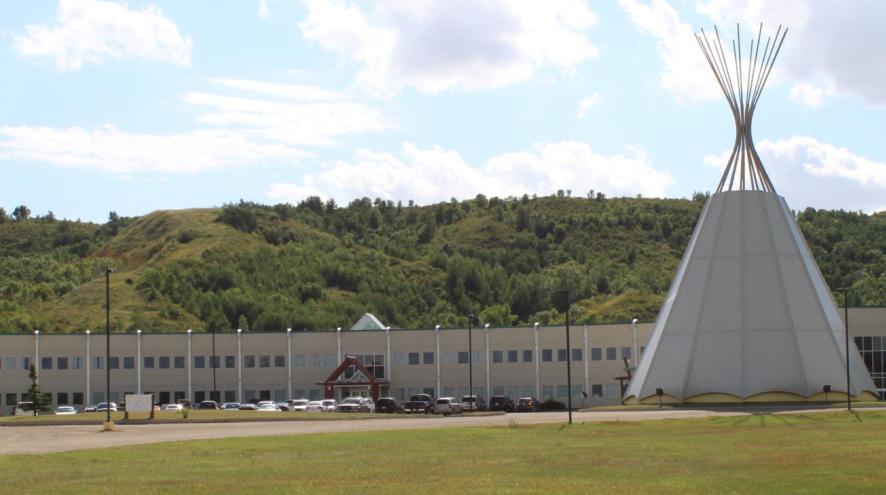Brain Health in Treaty 4
The File Hills Qu’ Appelle Tribal Council invited us to their event on promoting brain health and celebrating current health research taking place throughout Treaty 4 Territory.

The event coordinators, Nicole Akan who is a research coordinator at File Hills Qu’ Appelle Tribal Council (FHQTC), and Letebrhan Ferrow who is a research assistant for McMaster, invited the Alzheimer Society, to attend their Brain Health Fair to share resources and connect with other health professionals in the region. Participating organizations included Careica Health, The Saskatchewan Health Authority, and representatives from the File Hills Qu’ Appelle Tribal Council involved in research and health care services.
This day provided an opportunity for attendees to learn more about local research that is taking place throughout Treaty 4. Presentations from research projects took place in the morning, while the afternoon gave attendees a chance to network and gather resources from collaborating organizations.
Summary of Speakers
The day commenced with opening prayers from a local Elder, Felix Asdohonk, followed by a panel of speakers discussing the research projects that have been taking place in the FHQTC area.

Marita Crant
Standing Buffalo band member spoke on the Brain Health Support Program (Brain Health PRO). Brain Health PRO was created by experts in brain health and aging and is an online educational program that will teach you about lifestyle changes that may help lower your risk of dementia. The program gives you essential tips on how to keep your brain and cognition healthy as you age.
Crant stressed the importance of brain health, eating well and keeping our mind busy. She further explained how considerations for our heart and brain health are important for the journey throughout life. Crant expressed that everything in the body is connected, and our health is one of the most important pieces of our lives. A main takeaway from Crant’s presentation is that we need to learn to listen to our body and what our brain and heart are telling us.
Nicole Akan
Akan shared on the Canadian Indigenous Cognitive Assessment (CICA) Nakoda project.
The CICA is a new tool to understand dementia and assess cognitive decline, that can be used by care partners and health professionals.
Akan highlighted that in research projects aimed at improving community health outcomes, it is important to give community members a voice, which led to changes to the CICA. This test can be done with items most people have in their homes, such as a dish towel, paper, and pens, and takes only around 10 minutes to complete.
This presentation also taught us multiple words in the Nakoda language, including pinámaya, which translates to thank you.
For more information on this project, please visit: https://ccna-ccnv.ca/news/announcing-the-launch-of-the-canadian-indigenous-cognitive-assessment-cica/
To download the CICA Toolkit, visit: https://www.i-caare.ca/cica
Nicole Anderson
Senior Scientist at the Rotman Research Institute, Baycrest Centre and Cognitive Psychologist, presented on the cognitive aging research happening through Baycrest at the University of Toronto. Baycrest is the national scientific headquarters for the Canadian Consortium on Neurodegeneration in Aging (CCNA), which aims to maximize the coordination and impact of dementia research across Canada.
Anderson highlighted that at least 40% of dementia cases can be prevented through risk reduction actions and that at least 49% of dementia cases in Canada can be attributed to 12 modifiable risk factors. Anderson also discussed the Brain Health PRO modules, which give you essential tips on keeping your brain and cognition healthy as you age.
To learn more about the Brain Health Assessment visit: https://cogniciti.com/
Jennifer Walker
Is a co-lead of the Canadian Consortium on Neurodegeneration in Aging’s (CCNA) Team 18 – Issues in Dementia Care for Indigenous Populations and the lead for the Indigenous Cognitive Health Program, as well as the Indigenous Health Data and Aging (IHDA) research program at McMaster University, spoke on transforming First Nations Dementia Research to Action.
Walker highlighted the need for self-determination to build actions. The goal of research should be to shift away from using research to highlight problems, but instead use it to create actions and solutions. The efforts of the IHDA are focused on trying to shift this approach into dementia research.
Walker explained data for decision-making and planning should inform decision-making for communities that have governance over their own research and data.
Caring for Your Brain in Indigenous Communities
The day also featured the launch of a video covering actions to reduce the risk of featuring FHQTC community members.
Video by: Anaquod Videography
Some advice given in the video included:
- You do not need to have access to a gym to stay active, just find ways to keep moving.
- Social health impacts our brains, staying connected keeps us healthy.
- Take care of your hearing and balance to prevent dementia and promote brain health.
- Brain activities, such as reading, are a great way to keep your brain active.
- Sleeping is very important.
- Lifestyle factors influence our health, avoid smoking and alcohol use.
- Heart health is strongly connected to brain health.
- Spend time in nature, nature is healing and can help you de-stress.
- Stay connected to your culture. Keep yourself balanced through prayer and smudging.
Additional Resources:
Brain Health Pro, discussed by both Anderson and Crant, can be found at: https://brainhealthpro.ca/
The Canadian Consortium on Neurodegeneration in Aging (CCNA) site https://ccna-ccnv.ca/
Video: A conversation on Indigenous Peoples and dementia: https://alzheimer.ca/en/help-support/dementia-resources/dementia-talks-canada/indigenous
File Hills Qu’Appelle Tribal Council https://fhqtc.com/
Contact Erica Zarazun, the Alzheimer Society of Saskatchewan’s Public Awareness Coordinator, for resources for your community. Email: [email protected]
